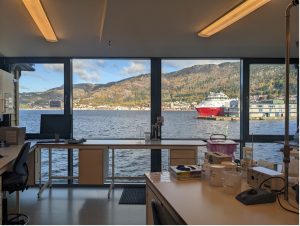Why internship during your PhD programme can be truly valuable: New experiences from the NORBIS internship program
Written by Petra Hribovšek, PhD candidate in microbial ecology at Center for Deep Sea Research, University of Bergen
From the Norwegian graduate research school in bioinformatics, biostatistics and systems biology (NORBIS), I received a grant that allowed me to pause my PhD research for three months last fall and get to my three-month research stay at the Institute of Marine Research in Bergen. According to NORBIS, the objective is “to explore a career path outside university and to establish and expand your professional network”. When I am writing this report, I dare say this has been accomplished and the whole experience was truly worth the effort.
The work during my stay focused on the project investigating the effect of novel feed mycotoxins on the Atlantic salmon and its gut microbiota. The aim is to do a metaproteomics study and explore the effect of mycotoxins on the fish gut microbiome, using 16S rRNA gene amplicons. This is part of a larger project, and almost immediately after starting, I could be present at a larger project meeting, which was a great springboard. At the same time, we started thinking of a side project connected to method testing. The work itself let me use some of my knowledge and build on it. During my time at IMR, I have done lab work, planning, summarizing research done on the topic and reading up on the bioinformatics part. We will keep in contact to wrap up the bioinformatics side of the work and I will take part in the research paper writing process.
The view from the lab at my internship site. Great for resting your eyes whenever waiting for that centrifuge to finish.
The Seafood Hazards group has made me feel quite welcome, with my own office, pleasant morning coffee time and lunch breaks with colleagues working in many different areas. Being able to be present at bi-weekly briefings on different projects’ progress and at social activities was great and gave me a taste of what working there felt like. Some of what I’ve achieved has been very valuable, more than just results. It has given me a great possibility to come in contact with other research environments, see how other people manage projects and get a view into how research institutes operate, given that I’ve previously interacted mostly with universities. This stint has enhanced my resume with new skills to add and, perhaps, improved my prospects of career success after PhD. It certainly helped me reflect on how to approach work options after my defense. It also reminded me that I can quickly absorb information, dive into a new field and new tasks and perform them independently and gather relevant information from literature. It has been beneficial for both me and my internship hosts: I had had the opportunity to work on things that they wanted to explore but did not have all the resources themselves to pursue at that moment.
I value this experience, and it is certainly a privilege to do this kind of thing. In an ideal world, everyone working towards their PhD should have the option to do such an internship and I hope this can become more accessible in the future. Given the short period, I recommend others to plan their stay and communicate the plan with your internship host as much as possible in advance. This helps to make the most out of one’s internship and to learn to be flexible when changes to the plan occur, as they most likely will. If you can, join the social aspects of it and see how the daily routines look like for everyone there. Initially, I had planned to work on my PhD project in the evenings during my internship, but I soon discovered that this was not a feasible long-term approach. Since all the new experiences at work demand extra energy, I decided to adjust my expectations and center my attention on fully experiencing the internship.
Upon return to my PhD program, the end of my contract has been extended by three months, allowing me to focus on completing the research for my project. While at IMR, I have also picked up some new ideas and I feel I have developed my thinking process on my PhD topic through talking to a diverse group of scientists. I feel a bit revitalized, with a fresh perspective and am eager to get things done.
I want to thank Julia Storesund, Kai Lie Kristoffersen and Josef Rasinger for taking the opportunity and for every person at IMR who helped and made me feel welcome from day one. And I’m thankful my PhD supervisor was on board with this.
I appreciate NORBIS giving me this chance.
Note: The work done throughout the internship is a part of the AquaMyc project funded by the Norwegian Research Council (Tolerance of Atlantic salmon to novel feed mycotoxins – Implications on fish performance and nutrient interactions, project number 281032).
